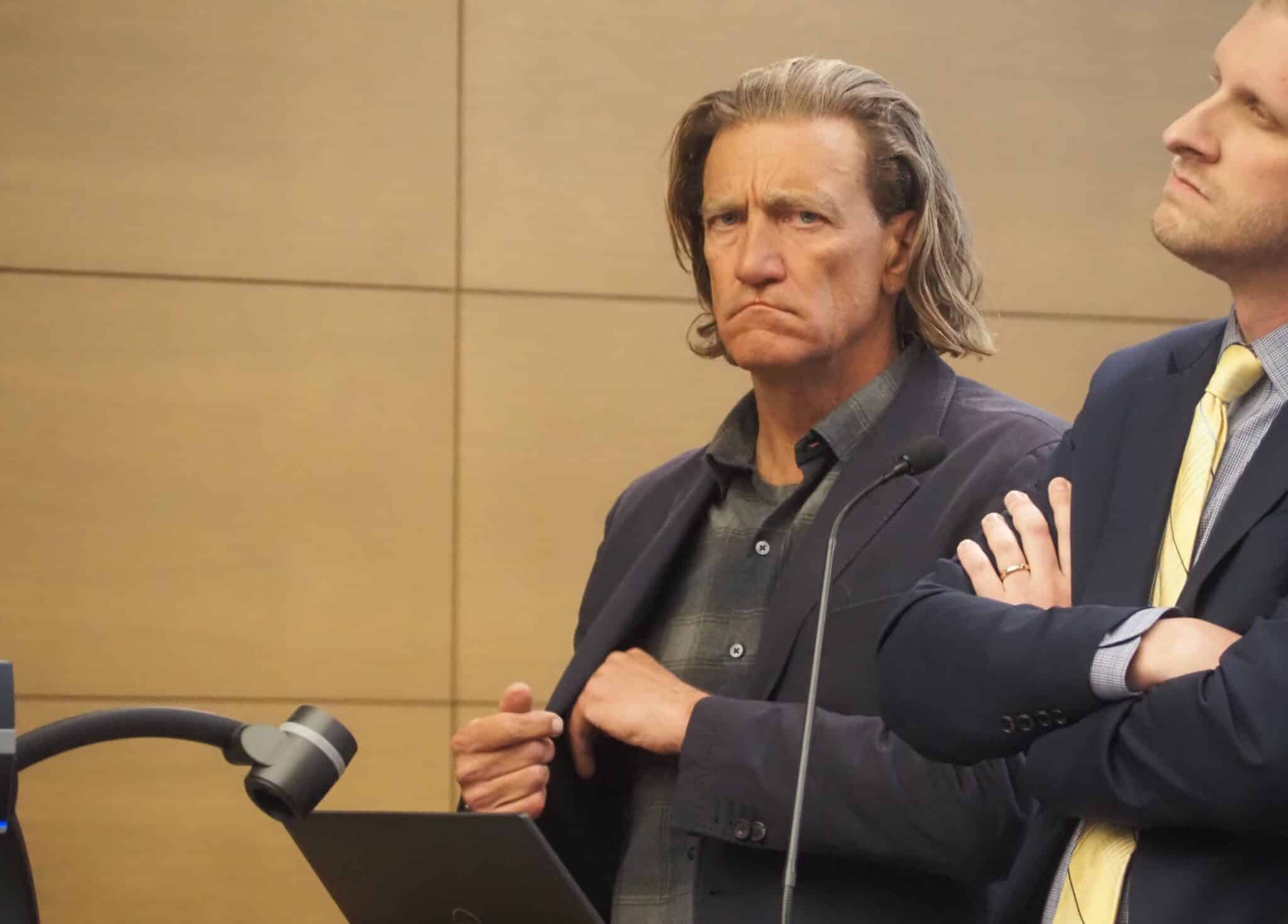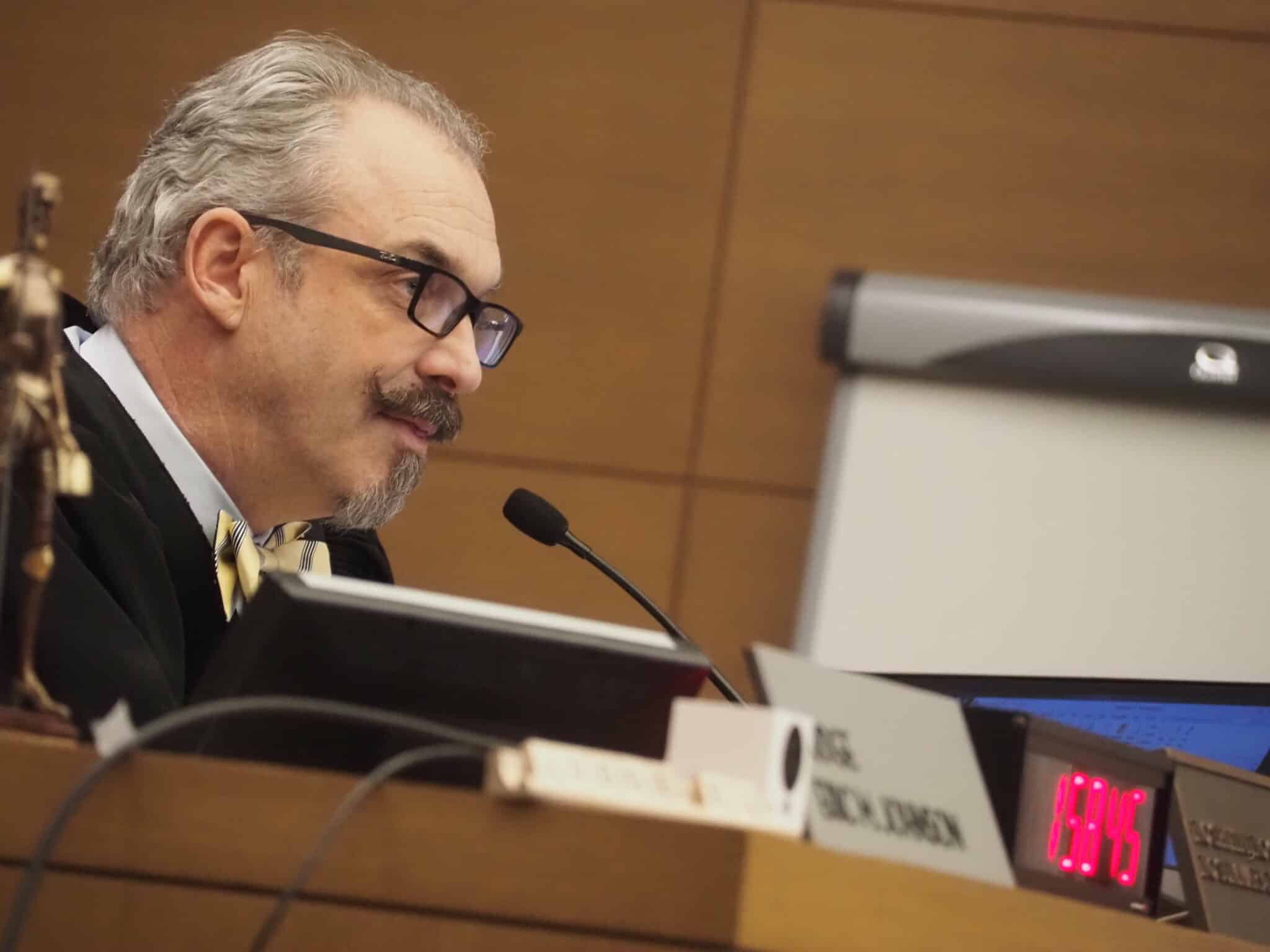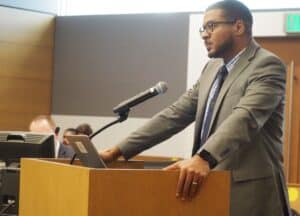
Steve Bachar, 57, eyes the crowd during his sentencing hearing in Denver District Court on Friday, March 10, 2023. (Justin Wingerter photos)
During a dramatic hearing in a downtown Denver courtroom Friday, a judge rejected a plea agreement between prosecutors and disgraced businessman Steve Bachar that would have allowed him to avoid prison time. The case will instead move ahead to trial.
“I will not accept the disposition as proposed,” Denver District Court Judge Eric Johnson said during the early afternoon hearing. The judge added, “It is contrary to justice. Justice in this society cannot be seen as being able to buy oneself out of a felony conviction.”
“Many in our community steal much less and go to prison or to jail,” Johnson said. “They steal much less and they don’t get a deferred judgment because they don’t have any money.”
Johnson’s unusual decision followed expressive testimony from Jamie Lindsay, a North Carolina man who Bachar admitted stealing $125,000 from and who was to be the recipient of the $174,370 restitution payment that Bachar turned over to the court earlier this week.
Under the plea agreement, Bachar was supposed to be sentenced to probation if he turned over the money. But Lindsay asked that Johnson reject the plea agreement, even though it will mean that Lindsay, a 74-year-old man with late-stage cancer, will not receive the money.
“I am not convinced that he will stop (stealing),” Lindsay said of Bachar. “If it causes me to lose the $174,000, then so be it. At some point, guys have to stand up for what is right.”
Johnson wrestled with whether to accept or reject the plea agreement for several minutes, thinking aloud as he weighed the decision. He commended Deputy District Attorney Isaam Shamsid-Deen for getting full restitution for Lindsay in the case and acknowledged Bachar had upheld his end of the agreement by turning over the money before the hearing.
“I apologize to you that this went down this way,” the judge told Bachar after making his decision.

Denver District Court Judge Eric Johnson listens to testimony during a sentencing hearing on Friday, March 10, 2023. (Justin Wingerter photos)
Bachar was then allowed to change his guilty pleas to not-guilty pleas. The would-be restitution money will now be returned to Bachar in the coming days.
Bachar and his attorney Robert Swestka, a public defender, appeared frustrated throughout the hearing, frequently shaking their heads and staring hard at Johnson. Swestka accused the judge of letting Shamsid-Deen and Lindsay speak while ignoring him and his client.
“This is a miscarriage of justice,” he said of the judge’s decision to reject the plea agreement, noting that Shamsid-Deen and Lindsay had both referenced civil cases and extraneous allegations against Bachar. “It seems the court has been swayed by unrelated conduct.”
Swestka said he will be filing a motion that could force Johnson to recuse from the case. Meanwhile, a four-day trial is scheduled to begin Sept. 26.
“You can file your motion but I have not been swayed. I still don’t know his history,” the judge told Swestka before repeating his concerns about economic status and fairness. “Day in and day out people go to prison for stealing a lot less than $174,000.”
Bachar, who was an attorney himself before being disbarred last June for ignoring court judgments, did not speak during the hearing Friday. He wore a dark shirt, unbuttoned at the top, with a dark blazer over it. His shoulder-length blonde hair was tucked behind his ears.
The 57-year-old pleaded guilty to felony theft and misdemeanor theft on Nov. 14. He admitted that in 2017, he urged Lindsay to invest in a business consulting company that Bachar co-owned. Lindsay invested $125,000 after Bachar assured him it was a safe investment.
Bachar failed to disclose that he wasn’t authorized to sell a stake in the company. Instead, he took Lindsay’s money and spent it on travel, meals and other personal expenses.
“It turns out he was focused on nothing but living well and spending other people’s money in living well,” Lindsay testified Friday. He repeatedly called Bachar a “con man.”
Lindsay, a retired airline pilot, has known Bachar since 1992, when they worked together on Bill Clinton’s presidential campaign and then in the Clinton administration.
After losing money to Bachar, Lindsay was forced to sell his retirement home and continue working past retirement age while enduring cancer. He told the court that Bachar’s theft “was not a one-time situation” and warned that Bachar “will con again” if not imprisoned.
“I have a knot in the pit of my stomach because I believe that somebody was conned out of this money,” Lindsay said of the $174,370 in restitution that he was set to receive.
A short time later, Shamsid-Deen echoed those remarks, telling the judge, “The people do have concerns that the source of the money is not legitimate.” Bachar shook his head and threw up his arms at the allegation, for which the prosecutor did not provide evidence.
“We do have concerns about whether he’s robbing Peter to pay Paul,” Shamsid-Deen added.

Deputy District Attorney Isaam Shamsid-Deen prepares to speak during the hearing on Friday, March 10, 2023. (Justin Wingerter photos)
Bachar, a former Denverite who now lives on the Western Slope, was set to be sentenced Feb. 17 but contracted COVID-19 in the days before. He was said to be suffering from a severe cough and other symptoms, so Johnson rescheduled the sentencing to March 3.
Bachar then skipped the March 3 hearing for undisclosed reasons, leading Johnson to issue a warrant for his arrest and reschedule his sentencing for Friday afternoon.
The attempted restitution payment comes at a time when Bachar is being ordered by three different judges in the city to pay a combined $4.8 million to three other victims.
In the most recent case, Denver District Court Judge Shelley Gilman ordered Bachar to pay $700,000 to DaVita on Jan. 13. The Denver-based dialysis company first sued Bachar in October 2020, claiming it paid him $605,000 for N95 masks that he never provided, and won a default judgment against him after he ignored the lawsuit. DaVita sued him again in June 2022, saying he had refused to pay the $700,000 court judgment.
On Dec. 27, Bachar was ordered by Denver District Court Judge Stephanie Scoville to pay $250,000 to Robert Hanfling, a retired energy consultant. Hanfling loaned $99,000 to Bachar more than a decade ago and was never repaid. He sued Bachar in early 2022.
Bachar also owes $3.8 million to Sanitas Solutions, which won a court judgment against him in 2021. The company, formerly known as Future Health Co., said Bachar was hired to act as a middleman between it and the state of Wisconsin, which needed 3 million medical gowns in 2020, but Bachar kept the money he was paid by Wisconsin and never paid Sanitas.
“I’m not the only victim,” Lindsay testified Friday, as he asked that Johnson let a jury decide Bachar’s fate. “I’m just one part of a long pattern of deception by the defendant.”
